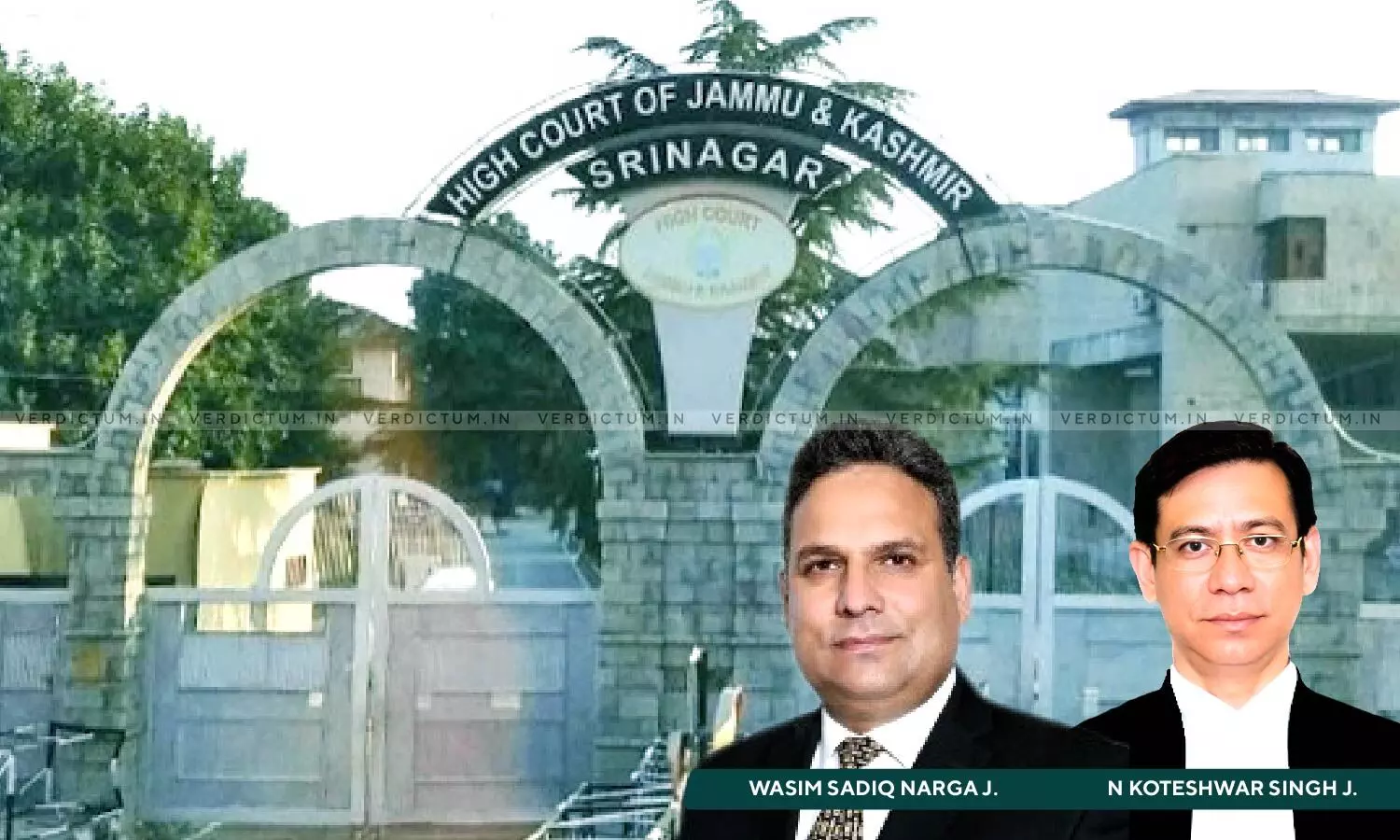
In Absence Of Departmental Enquiry, Services Cannot Be Put To End With Stigmatic Order: J&K&L High Court Reinstates Police Constable
 |
|The Jammu and Kashmir and Ladakh High Court while allowing an appeal challenging an impugned order of the Central Administrative Tribunal (CAT), has set aside the order of discharge of a Constable in the J&K Armed Police. The Court further directed the Union Territory of Jammu and Kashmir to reinstate the petitioner with immediate effect, where he would also be entitled to consequential benefits minus the monetary benefits, retrospectively.
A division bench of Justice Wasim Sadiq Nargal and Justice N. Kotiswar Singh inter alia observed, “The petitioner has been discharged by virtue of order impugned by way of a stigmatic order by incorporating that ‘he had not proved to be a good officer and his conduct did not remain satisfactory during the probation period’ and the stigma was required to be enquired into by conducting a detailed enquiry and providing an opportunity of being heard to the petitioner. In absence of any enquiry being conducted or providing an opportunity of being heard to the petitioner, the order impugned cannot sustain the test of law as the stigma attached to the aforesaid order will haunt the petitioner for all times to come for his future employment”.
Advocate Sarfaraz Hamid Rather, appeared for the petitioner while Senior AAG Monika Kohli appeared for the Union Territory of Jammu and Kashmir and others.
Based on the factual matrix, arguments advanced, and contentions rose the Court concluded:
- that Rule 187 of the Jammu and Kashmir Police Manual can be pressed into service only in the eventuality when a constable is found unlikely to prove an efficient police officer and can be discharged by the Superintendent at any time within three years of enrolment and not otherwise, therefore in the present case the rule did not apply.
- that the powers under Rule 187 can be invoked only against a probationer within a period of probation i.e., three years from the date of enrolment and not to a permanent employee after a period of 15 years from the date of his appointment.
- that the services of petitioner is protected under Article 311(2) of the Constitution of India and the procedure as envisaged was required to be followed by giving an opportunity of being heard to the petitioner.
- the punishment of discharging the petitioner from services is major and not commensurate to the gravity of the allegations leveled against him.
- The order impugned is in flagrant violation of the direction issued by this Court in the earlier round of through which the stigmatic order of discharge was quashed.
In the present matter, the petitioner was appointed as a Constable in the Jammu and Kashmir Armed Police on February 23, 1993. Later, due to medical reasons in May 1994, he left for medical treatment after informing the seniors, and returned to work on July 5, 1994. Pursuant to which, an enquiry on the alleged misconduct was initiated, while the petitioner contended that it was without any formal charges or opportunity to defend himself.
It was further alleged that the reasons for absence were acknowledged by the inquiry officer, who recommended treating the period as "Dies Non". However, a show-cause notice was issued regarding discharge. Unfortunately, the petitioner fell ill again, and sought permission on September 6, 1994, and resumed duties on November 7, 1994, only to discover he had already been discharged through Order No. 666 of 1994, dated November 2, 1994.
Therefore, the petitioner had assailed the judgment and order dated July 1, 2021 passed by the CAT, Jammu, through a writ seeking to quash the order for discharge as the discharge being without enquiry and without following principle of natural justice. Reinstatement into service along with with all consequential benefits was thus prayed for.
The Court while setting aside the impugned order held, “The respondents are directed to reinstate the petitioner with immediate effect. The petitioner is also held entitled to all the consequential benefits minus monetary benefits retrospectively from the date he joined his services i.e., w.e.f., February 23, 1993, as this Court is not aware whether the petitioner during the intervening period was gainfully employed elsewhere or not”
Cause Title: Shamim Ahmed v. UT of JK and Ors.
Click here to read/download the Order